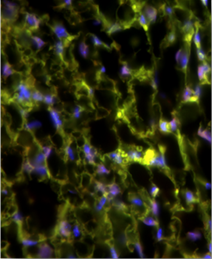Kate J. Claycombe-Larson Lab
Overview of Research Interests

Beige adipocytes (in Green) from subcutaneous adipose tissue of mouse offspring fed material high fat diet.
Dr. Larson's research interests focus on the role of adipose tissue inflammation and anti-inflammatory nutrients in reducing metabolic disease risks in obese humans and animals. Dr. Larson's research led to her discovery that stromal vascular fraction (SVF) cells and particularly adipose stem cells secrete the highest levels of interleukin-6 (IL-6) as well as monocyte chemotactic protein-1 (MCP-1) when compared to other cell types in the adipose tissue cells of obese animals. Dr. Larson's research team is currently investigating how inflammatory functions of SVF and adipose stem cells of obese animals are regulated by n-3 polyunsaturated fatty acids or flavonoids. Dr. Larson's current research interests also includes studying how maternal and neonatal environments affect adipose tissue cell functions in animal models of obesity.
Dr. Larson’s research focus is on adipocyte biology to determine the development of obesity and metabolic comorbidities. Integrating her experience in nutrition metabolism, molecular biology, and immunology, she has used animal and human models to dissect the link between inflammation and obesity. Her current research primarily focused on aspect of nutrition programming published key findings regarding epigenetic and diet interactions as critical regulators of adipose tissue development. Her most recent research was recognized two years ago by American Society for Nutrition (ASN) through the Norman Kretchmer Memorial Award in Nutrition and Development. She is very active in professional Nutrition (ASN) and the Obesity Societies (TOS) has serves as member and chair of the Nutrient-Gene Interactions RIS (ASN) and in the Basic Science Program Committee (TOS). She has organized and chaired/co-chaired several EB and TOS symposia and has served on several federal agencies committees (USDA and NIH) including the INSPIRE Working Group for NIH, and the Institute of Medicine Basic Science Agenda Subcommittee and other NIH, USDA, and AHA peer review committees. She served 3 years ago as chair of the Obesity Society’s Basic Science Section and is an active member of several editorial boards such as the Journal of Nutritional, Journal of Nutritional Biochemistry, and Frontiers in Immunology.
Some of her major contributions to science include her discovery that stem cells in adipose tissue are highly inflammatory in obesity. One of her papers was featured on the cover of the Journal of Nutrition in Oct 2004 and was extensively cited. She further documented key inflammatory mechanisms through which fish oil reduces inflammation. Another major contribution of hers is her most recent work on protein malnutrition and its lasting effects postnatally in the offspring by causing obesity and insulin resistance through epigenetic mechanisms. These novel findings documented the importance of maternal proteins in adipose tissue growth in offspring and identified some of the contributing mechanisms (igf2 gene methylation). These important findings provide the basis for further studies in humans.